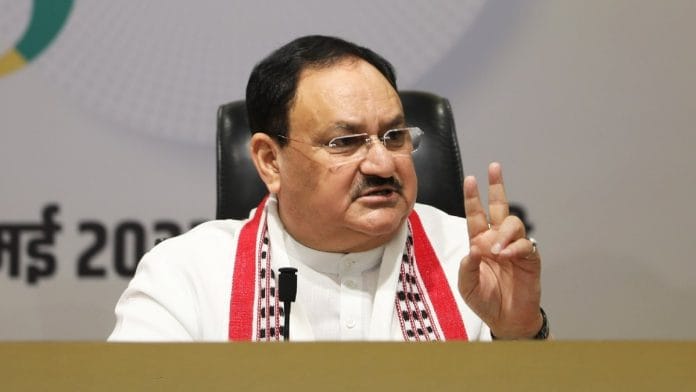New Delhi: Pointing out that his party has passed no other resolutions in connection with temple-mosque disputes since the 1989 Ram Janmabhoomi resolution in Palampur, BJP president J.P. Nadda said Monday that the Gyanvapi mosque dispute in Varanasi will be decided by the court and in accordance with the Constitution.
“We have always spoken about cultural development. But these issues are under the Indian Constitution and the court. These issues are decided by the court and the Constitution and BJP implements it in letter and spirit,” Nadda said at a press conference, when asked whether the Gyanvapi issue was on the agenda of the BJP government.
The press conference was organised at the BJP headquarters to mark eight years of the Narendra Modi-led NDA government being in power at the Centre.
In 1989, the BJP had adopted the Ram temple demand as part of its political plank. Asked if the issue of reclaiming temples at Kashi (Varanasi) and Mathura are still on the BJP’s agenda, Nadda said: “We had gone for a resolution on Ram Janmabhoomi in Palampur, after that there has been no resolution.”
This is one of the first official reactions of the party on the Gyanvapi issue even as individual leaders have been going public with their opinions on the same.
From BJP MP Harnath Singh Yadav to the party’s Madhya Pradesh in-charge P. Muralidhar Rao, from Chhattisgarh’s former home minister Brijmohan Agrawal to former UP minister Sidharth Nath Singh — all have pushed for a relook at the provisions of the Places of Worship (Special Provisions) Act, 1991, the main bone of contention in the Gyanvapi controversy, and a campaign to “reclaim” the temples in Kashi (Varanasi) and Mathura.
The Places of Worship Act provides for the maintenance of the religious character of any place of worship as it existed on 15 August 1947.
Also Read: Plea to worship Hindu idols, survey row — the latest Kashi Vishwanath-Gyanvapi legal tussle
‘We believe in justice to all and appeasement to none’
Nadda was also asked about how a section of the society feels alienated. To this, he said that the BJP government works on the mantra of ‘Sabka Saath, Sabka Vikas and Sabka Vishwas’, and works on the principle of building a strong nation.
“When we work politically, it is our endeavour to take everyone along. We have to be ready for it. We are ready for it. There are many types of people in a society. Some respond earlier, some later, some after decades and some respond after much time has passed. It depends on them. But our conduct is based on the principle of a strong nation, one nation. This is clear and everyone will have an equal share,” he said.
Nadda also pointed out that while the Uttarakhand government has formed a committee on the Uniform Civil Code, the BJP has always worked on the principle of “justice to all and appeasement of none”.
“We believe in justice to all and appeasement to none. We work according to that principle. We believe in taking everyone together,” Nadda said.
‘Last-mile delivery of govt schemes has been biggest challenge’
The BJP president also said that “seva, sushasan and garib kalyan” (service, good governance and welfare of the poor) are the soul of the Modi government.
Recounting the work of the BJP government in the past eight years, he said that ensuring last-mile delivery of various government schemes has been the biggest challenge of the Modi government.
“Prime Minister Modi has himself taken care of last-mile delivery,” he added.
Nadda also launched a special campaign called ‘8 Years of Seva, Sushasan & Garib Kalyan’ to reach out to citizens, especially the youth, through the ‘NaMo’ app.
(Edited by Gitanjali Das)
Also Read: Congress backs Places of Worship Act amid Gyanvapi row, in bid to do ‘what Gandhi would do’






